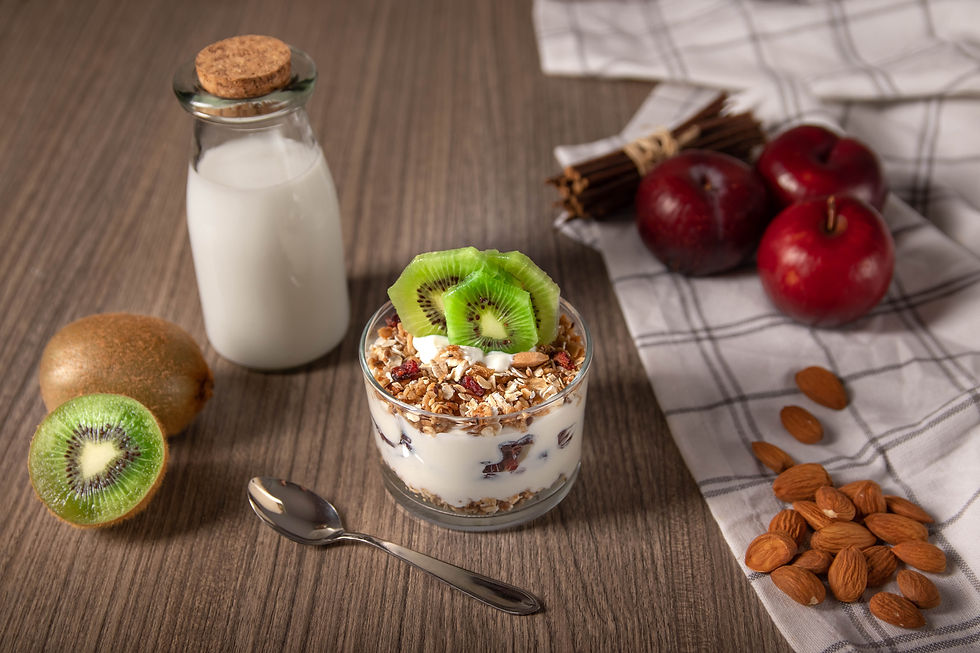Disordered eating... Or not?
- jenpfeifler
- Aug 22, 2020
- 3 min read
Updated: Jan 5
Challenging Intuitive eating vs. eating with rules and rigidity
Jen Pfeifler LD, M.s. | Updated January 2025
Since I began working as a dietitian specializing in eating disorders, certain foods come up time after time. Let’s take plain greek yogurt as an example. Some choose it because they think it's the 'healthiest', some because it tastes the best and some because it's the only type they think they are allowed to eat defined by diet culture and the rules they have placed on themselves.
Marketing plays a huge role in our diet culture and why we choose certain products over others. One of the topics I discuss with my clients is how marketing acts on our vulnerability and “nudges” us to choose products based on how it makes us feel. Next time you go to the grocery store, take a minute to check out which labels are highlighted and what message the company/brand is trying to relay. Then think about how the labeling might persuade you or has persuaded you in the past. Some examples might be “high protein” or “no added sugar” or the most recent marketing ploy “only 5g net carbs”.
If you are like most people, particularly ones who are vulnerable to insecurities around weight and/or perceived emotional eating you would likely feel that the no sugar or high protein yoghurts are the only ones you are allowed to have to be “good”.

So, let's talk about why this topic is worth a whole blog. The fact that there's a yogurt with 15g of protein and no added sugar is great. It's also great that there are other yogurts that have added sugar, are higher in fat, have mixed pureed fruit, and some that have no fruit. Choosing a yogurt that has higher protein and no added sugar is not a bad thing. It becomes a problem when this choice becomes the ONLY choice or is based on rules or the mindset that the other yogurts are 'bad' for you. The point I want to make is that the situation in which you choose a particular yogurt is key. There are no good or bad kinds of yogurt. There is only variety, and maintaining variety in your food choices (across all food groups) is very important in living a healthy and balanced life.
If you are an athlete, a gym junkie or someone who exercises regularly, the higher protein yogurts would be a great choice. Since dairy is optimal for muscle maintenance and growth, a higher protein yogurt is a great option. Depending on your level of intensity and duration, you may need to think about adding in some additional carbs, as <10g of carbs isn't going to do the job in aiding muscle recovery. Even if you aren't an athlete or do minimal exercise, higher protein yogurts are still a great choice. It will provide a solid protein rich snack for mid meals, or complement to main meals, especially if you are a vegetarian and struggle getting enough protein in your diet. On the other hand, the other yoghurt options are also a great snack, dessert etc particularly if you're on the go and don't have a muesli bar or some fruit (for energy) to pair it with. You can still get some protein, calcium, fat and carbs in to fuel your day.
I can sit here and break down the different kinds of flavors and types apart based on their nutritional value, but at the end of the day will 1-2 grams of protein make much difference if you are eating adequately? If you are an active person, would you be better off having the normal flavored yogurt to better meet your carbohydrate demands? Branding is incredibly influential, and just because something says “high protein” or “low sugar” on it, doesn't mean it's always going to be the best choice for you to stay healthy. Above all, if you genuinely dislike a particular yogurt flavor, don't buy it! And if the higher protein options are the best for lactose sensitivities or the only ones you can stomach as dairy isn’t everyone’s favorite snack, then by all means go for it!
If you find yourself questioning your motives, or are ready to change your thinking, it is ALWAYS worth playing it safe and double checking with a dietitian. There ARE dietitians who specialize in eating disorders and disordered eating who will help guide you to increasing your flexibility in food choices allowing you to eat socially, spontaneously and enjoyably in a non-judgmental manner.

Pictured at River Oak Health with Megan Bray, a dietitian in Brisbane, Australia who also specializes in eating disorders (2018)
Initially Written for River Oak Health (Brisbane, Australia)
.png)



Comments